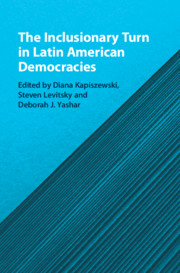Book contents
- The Inclusionary Turn in Latin American Democracies
- The Inclusionary Turn in Latin American Democracies
- Copyright page
- Contents
- Figures
- Tables
- Contributors
- Acknowledgments
- Prologue: Reflections on Two Episodes of Popular Inclusion
- 1 Inequality, Democracy, and the Inclusionary Turn in Latin America
- Part I Extending Social Policy and Participation
- Part II Inclusion and Partisan Representation
- Part III New Party–Society Linkages
- Part IV Inclusion, Populism, and Democracy
- 12 Pathways to Inclusion in Latin America
- 13 Inclusionary Turn, Rentier Populism, and Emerging Legacies
- 14 Strong Citizens, Strong Presidents
- 15 Shaping the People
- 16 The Inclusionary Turn and Its Political Limitations
- References
15 - Shaping the People
Populism and the Politics of Identity Formation in South America
from Part IV - Inclusion, Populism, and Democracy
Published online by Cambridge University Press: 12 January 2021
- The Inclusionary Turn in Latin American Democracies
- The Inclusionary Turn in Latin American Democracies
- Copyright page
- Contents
- Figures
- Tables
- Contributors
- Acknowledgments
- Prologue: Reflections on Two Episodes of Popular Inclusion
- 1 Inequality, Democracy, and the Inclusionary Turn in Latin America
- Part I Extending Social Policy and Participation
- Part II Inclusion and Partisan Representation
- Part III New Party–Society Linkages
- Part IV Inclusion, Populism, and Democracy
- 12 Pathways to Inclusion in Latin America
- 13 Inclusionary Turn, Rentier Populism, and Emerging Legacies
- 14 Strong Citizens, Strong Presidents
- 15 Shaping the People
- 16 The Inclusionary Turn and Its Political Limitations
- References
Summary
Can populism be a source of long-lasting changes in citizens' beliefs, behaviors, and political identities? This chapter follows recent literature in treating populism as identity-shaping. Populist movements mobilize constituencies based on anti-establishment appeals that draw a wedge between a "corrupt elite" and a "victimized people" of the nation. It is electorally advantageous to define the "people" in a broad but bounded way, such that there is simultaneously a large, heterogeneous coalition of voters and a clearly defined enemy. We show through observational and experimental evidence that populism's emphasis on a broad but bounded concept of the people can shape the distribution of citizens' identities by reducing the cost and increasing the benefit of assuming non-elite social identities. Populist discourse is thus an identity-shaping political tool that can serve to incorporate those at the margins. This heterogeneity, however, creates a sustainability problem. With little to glue its members together beyond their anti-elite status, populist support coalitions are particularly vulnerable to disintegration after victory. We argue that some correlates of populism, like redistributional economic policies, and a tendency to organize constituents, are driven by the populists' need to stabilize their support coalitions. We argue that these are identity-stabilizing political tools.
Keywords
- Type
- Chapter
- Information
- The Inclusionary Turn in Latin American Democracies , pp. 491 - 517Publisher: Cambridge University PressPrint publication year: 2021

